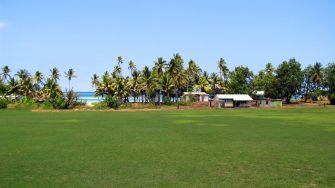UNSW Engineering deepens ties in Fiji
A high-level delegation from UNSW Engineering travelled to Suva in October to progress exciting initiatives with university and industry partners.
A high-level delegation from UNSW Engineering travelled to Suva in October to progress exciting initiatives with university and industry partners.

The University of New South Wales (UNSW) has a rich history of engagement with Fiji, fostering relationships with universities, the Fijian Government, local businesses, and civil society. A high-level delegation from UNSW Engineering travelled to Suva, Fiij, from the 23rd – 27th of October, to build on discussions held during a previous trip in November 2022 and to map out next steps on key initiatives with university and industry partners. As part of this, the delegation also explored opportunities for further faculty engagement that aligns with our commitment to societal impact and engagement in the South Pacific more broadly.
Delegates included Deputy Dean (Societal Impact and Translation) Professor Rita Henderson, Deputy Dean (Education) Professor Maurice (Morri) Pagnucco, Global Water Institute Director Professor Greg Leslie, Institute for Industrial Decarbonisation Director Professor David Eyre, Centre for Energy and Environmental Markets Joint Director Iain MacGill and Societal Impact and Partnerships Lead Dr Bodean Hedwards.
The UNSW Engineering delegation engaged in a series of meetings with local government departments including Investment Fiji and the Water Authority of Fiji, civil society organisations, and both the Australian and Indian High Commissions. Discussions centered on aligning UNSW Engineering capabilities with national priorities, highlighting that there are opportunities to support economic diversification, a clean energy transition and climate change responses. Investment Fiji highlighted that its Government is currently focused on tourism, agriculture, healthcare, and business process outsourcing, and that upcoming research will target emerging sectors like hydrogen, the blue economy and the development of sustainable building materials.
Ongoing engagement with the High Commissions will open doors for trilateral partnerships, and the UNSW delegation plans to explore opportunities to contribute to development in these key areas.
Professor Rita Henderson highlighted the significance of nurturing partnerships with Fijian stakeholders, saying, “the importance of developing new, and strengthening existing, partnerships to facilitate the co-development of strategies to leverage current opportunities in the region cannot be underestimated.”
“Visiting Suva to grow these connections was a huge pleasure and we look forward to the lasting relationships that we hope will result.”
The Fijian Government's commitment to education is underscored by the increasing investment highlighted in the recent Budget and National Development Plan, recognising the pivotal role of education in national development. During the recent trip, UNSW Engineering prioritised fortifying enduring ties with the University of the South Pacific (USP) and Fiji National University (FNU).
The focus extended to exploring collaborative avenues to bolster broader capacity-building initiatives, engaging both government and industry stakeholders. The ongoing prospect for collaboration with university partners primarily revolves around curriculum development and joint education initiatives, including staff and student mobility programs, along with the implementation of benchmarking processes for undergraduate degrees.
Professor Maurice Pagnucco emphasised the integral role of universities in fostering a region-wide educational uplift. Reflecting on the trip, he stated,
"We are committed to partnering with the leading universities in Fiji to co-design education programs and enhance access to world-leading engineering education, ensuring the next generation possesses the skills, knowledge, and networks vital for navigating the global shift toward more sustainable practices."
During the visit, Professor Rita Henderson also participated in a ceremonial signing to mark a collaborative project between UNSW, the Water Authority of Fiji (WAF) and the New Zealand Ministry of Foreign Affairs and Trade (MFAT). The project will deliver water catchment modeling and resilience planning in Fiji’s Waimanu and Sigatoka River catchments, and will be led by UNSW’s Professor Ashish Sharma.
UNSW has a long history of working with the Fiji Water Authority (WAF), and on the final day the Global Water Institute co-hosted a workshop with WAF to explore the potential to establish a centre to build capacity in WAF. The aim of the workshop was to establish a concept note on the opportunity articulating the vision for the centre, links to other initiatives, local capacity development opportunities and broader external engagement. The note was presented to the 52nd Pacific Island Leaders Forum Meeting in the Cook Islands and is currently under discussion.
The UNSW alumni roundtable and dinner on the final night of the visit aimed to gain insights into the interests and priorities of local graduates and explore new opportunities for engagement. The event saw active participation from diverse UNSW alumni, representing sustainable sea transport, sport, solar, tourism, banking, microfinance, town planning, women's empowerment, construction and consulting.
The alumni discussion delved into the role of universities in Fijian development, local priorities, and opportunities for collaboration with UNSW. Alumni expressed a desire for more direct engagement, moving away from the aid-based approaches that are commonly employed by international organisations. They also emphasised the need for sustained and impactful initiatives beyond project-based funding cycles. The alumni proposed developing stronger pathways for engagement, diversifying entry into UNSW and STEM sectors, and exploring alternative accreditation options such as micro-credentials. Potential areas for collaboration included knowledge partnerships, grant application support, capacity building initiatives, and providing access to the UNSW alumni network for key stakeholders.
Overall, the visit to Fiji was a fundamental step in strengthening relations between UNSW Engineering and Fiji, and demonstrates the Faculty’s commitment to engaging across the region in authentic, sustainable ways.